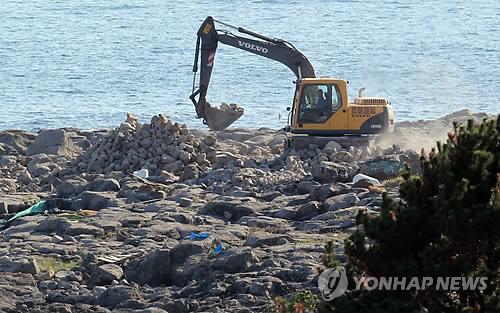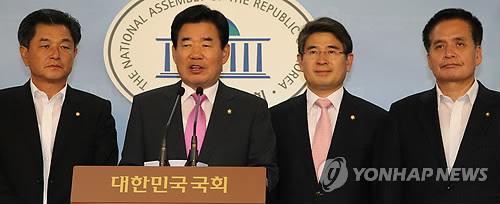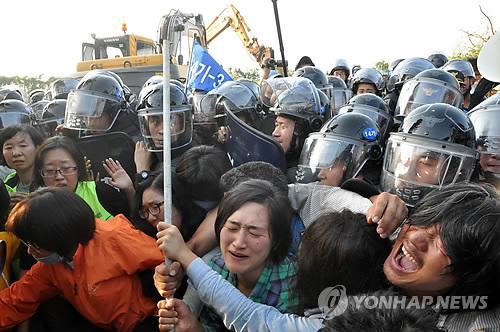Construction resumes on Jeju naval base, but rift among residents remains
.
Posted 07 September 2011, by Kim Eun-jung, MaritimeSecurity.Asia, maritimesecurity.asia
,
JEJU ISLAND, South Korea, Sept. 7 (Yonhap) — Along the southern coast of this resort island, trekking courses wind through hidden lush forests and pristine beaches, but near one village, the paths disappear abruptly.
A sense of uneasiness is palpable inside and outside Gangjeong Village, where an army of riot police have set up camp. Their mission is to guard the construction site of a massive naval base from violent protests that have raged for months, leading to the arrests of dozens of demonstrators.
In the past two years, Gangjeong villagers, most of them fishermen and tangerine growers, have been torn into two groups: those who support the base and those who oppose it.

An excavator is back in operation as naval base construction resumes Sept. 6 on Jeju Island. (Yonhap file photo)
The US$1 billion project, now a political cause celebre in South Korea, has so deeply divided the village’s nearly 2,000 residents that some now refuse to shop in the same stores as those on the other side of the ideological divide.
Construction resumed earlier this week after a 102-day suspension, but only after riot police moved in to extricate core protesters who had been holed up inside the construction site. Police quickly erected steel fences around the plot of land.
According to government officials, the base, when completed in 2014, will be home to about 20 warships and submarines. It will also be open to U.S. navy ships. About 28,500 American troops are currently stationed in South Korea, a legacy of the 1950-53 Korean War.
Supporters believe the naval base will bring economic benefits to Gangjeong and the island as a whole, but opponents argue that it will only damage the environment, aggravate the villagers’ daily lives and spur an arms race in Northeast Asia, particularly on the Korean Peninsula.
Government officials defend the project, saying that it will help protect the vital sea lanes in Northeast Asia that South Korean ships use to transport cars and other export goods worldwide. They note that exports account for more than 70 percent of South Korea’s economic growth.
“I really want this conflict to come to an end,” Kang Sun-ja, a villager, said, recalling the chaotic day last week when police moved in to evict dozens of core protesters camping out in the construction site.
She complained of the high-volume ruckus of protesters’ loudspeaker broadcasts that continued for more than two hours, urging villagers to come out to fight against the invading riot police.
Various environmental and anti-government activist groups from mainland South Korea have entered the fray, making it a high-stakes political issue. Opposition parties denounced the government for using force to suppress protests.

Lawmakers of main opposition Democratic Party criticize police raid at Gangjeong Village on Jeju Island at a press conference on Sept. 2. Riot police broke up months-long protest by residents opposiing construction of a naval base on the resort island. (Yonhap file photo)
On Monday, Jeju Gov. Woo Keun-min urged dialogue to resolve the dispute, claiming that the project has progressed to the point that there’s no turning back.
“Jeju Island and its people can’t exist without a country … Who can resist a government project when it’s needed for the nation?” the governor said in a statement.
But historic, deep-seated suspicions that many villagers harbor against the government are not expected to dissipate easily. Before the 1950-53 Korean War, government forces cracked down on “pro-North Korea leftists” on the island, which led to the massacre of 30,000 villagers, about one-tenth of Jeju’s entire population.
Older islanders with vivid memories of the Korean War tend to be more skeptical of government intentions over the project.
“The government says this project is for peace for the island and the nation. But even during the Korean War, our soldiers fought without a naval base here. Why do we have to build it now?” said Oh Byung-yoon, a 75-year-old resident of a nearby village.
Oh took particular issue with the disconnect between Jeju’s image as a “peace island” and the presence of a military base on its shores. “Once armed soldiers show up here, Jeju cannot be called a ‘peace island,’” he said. “War and peace cannot coexist.”
The ideological rift has even worked its way into residents’ homes.
“In some homes, husband and wife do not eat their meals at the same table,” said Kang Se-hyo, a 62-year-old tangerine farmer, explaining the deep divide in his strong Jeju dialect. “I really miss the good old days when everyone just got along well.”
The latest anti-base protests on Jeju were the most violent of their kind in South Korea in recent years. Similar protests erupted several years ago when the Seoul government pushed to relocate the bases of 28,500 U.S. troops out of Seoul, the capital, and away from the border with North Korea.

Riot police clash with protesters at Gangjeong Village in an early morning raid on Sept. 2. (Yonhap file photo)
The planned Jeju base, for its location, has strategic value, according to defense analysts. They note that Japan’s key seaport Nagasaki is closer than Seoul, and that Shanghai is only slightly further.
In the meantime, anti-base protests on Jeju have subsided and no further violence has been reported, but tension lingers. About a dozen activists, including a few Roman Catholic priests from the mainland, have set up camp near the steel fences, vowing to continue the protests.
One of the protesters, Father Moon Jeong-hyun, insists that the Jeju base will only help the U.S. military keep China under its watch and incite North Korea as it tries to arm itself with nuclear weapons.
“The Jeju naval base is no different from other U.S. military bases in South Korea,” said Moon, who in 2006 led massive protests against the U.S. military base relocation project. “If the naval base is built on Jeju, it is practically giving our front room to the American military. We have to fight against it.”
Hong Deuk-pyo, a political science professor at Inha University in Incheon, west of Seoul, said he supports the Jeju project because he believes it will help strengthen South Korea’s national defense.
“As China is increasingly flexing its muscles in territorial disputes and strengthening its economic power in Northeast Asia, South Korea should prepare for possible conflicts in the future,” he said.
Experts say that the quandary over the Jeju base illustrates South Korea’s awkward situation — sandwiched between its political and military protector, the United States, and its major economic partner, China.
China is South Korea’s largest trading partner, with two-way trade reaching $188.4 billion in 2010. The volume is expected to top $300 billion in 2015, according to Seoul government projections.
Some Jeju residents also oppose a government proposal to build a civilian port next to the naval base that would serve cruise ships, boosting the island’s image as a tourist attraction.
“I moved to Jeju a year ago because I wanted to live in the unpolluted air on this unindustrialized volcanic rock,” said Kwon Mi-ye, 35, who runs a small lodging house on the west coast. “I don’t know about complicated stuff. But fake decorations or big cruise ships will turn away people like me who came here to appreciate the serene nature of this environment.”
.
Posted by Will Jeju naval base trigger arms race in Asia? | MaritimeSecurity.Asia on September 12, 2011 at 11:18 am
[…] Construction resumes on Jeju naval base, but rift among residents remains […]
Posted by Naval Base Construction Hit by Opposition Parties and Organizations in S. Korea | MaritimeSecurity.Asia on September 12, 2011 at 3:44 pm
[…] Construction resumes on Jeju naval base, but rift among residents remains […]
Posted by Seoul seeks protection for Korean sailors on foreign ships | MaritimeSecurity.Asia on September 12, 2011 at 5:00 pm
[…] Korea Talks Must Quickly Move From Tactics to StrategyIn South Korea, the Only Thing Worse Than Online Censorship is Secret Online CensorshipSomali Pirates Face Justice, FinallySouth KoreaMysterious Virus Assaults South Korean CitizensSouth Korea’s education feverThe Newcomers to South KoreaConstruction resumes on Jeju naval base, but rift among residents remains […]
Posted by Police disperse protesters from naval site | MaritimeSecurity.Asia on September 12, 2011 at 10:13 pm
[…] Construction resumes on Jeju naval base, but rift among residents remains […]